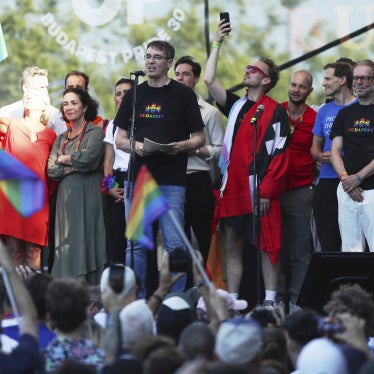President Vladimir Putin's widely reported statement to a group of volunteers in Sochi on January 17 that "gay sex is not a crime in Russia, so gay people can feel calm, at ease, but leave children in peace, please" was highly offensive. The casual suggestion that gay people are potential pedophiles is both untrue and dangerous. It is especially harmful and hurtful for a child in Russia who might be dealing with questions of his or her sexual identity, whom Mr. Putin wants to grow up without access to any relevant information.
Under the pretense of protecting children against an imminent danger that would be caused by receiving positive information about homosexuality, Russia last year introduced its anti-propaganda law, which targets lesbian, gay, bisexual and transgender people (LGBT). This law takes the position that positive information about homosexuality is harmful propaganda -- like positive information about doing drugs or suicide -- and needs to be stopped. The law is without doubt a serious infringement on the rights to freedom of expression, to privacy, to equality and non-discrimination of LGBT people.
But what about the children, whom Putin professes to be so concerned about? Is "shielding" children from positive and appropriate information about homosexuality in their interest? Does it respect their rights -- or violate them?
In the United Kingdom in the 1980s, Margaret Thatcher's government introduced legal provisions that prohibited teaching about homosexuality in schools. The UN Committee on the Rights of the Child examined the controversial law in 2002. This body of 18 independent experts that monitors implementation of the Convention on the Rights of the Child advised the United Kingdom to repeal the law. The committee said that countries need "to provide adequate information and support to homosexual and transsexual young people." The UK repealed the law in 2003.
Russia is also a party to the Convention on the Rights of the Child. Yet the members of the Duma and the government have chosen to ignore the rights of Russian children under the treaty to seek, receive, and impart information and ideas of all kinds. They have the right to have access to information that can promote their mental health; and to have access to non-discriminatory health care information and sex education. All this would of course include information about homosexuality that is necessary to develop their identity and "to deal positively and responsibly with their sexuality," as the UN committee put it.
Russia is also a member of the Council of Europe. On June 18, 2013, its advisory body on constitutional matters, the Venice Commission, rejected the argument that children were beneficiaries of the Russian law. The commission directly challenged Russia's claim that the anti-gay propaganda law falls within its discretion to protect morals or public health, finding that the law was not necessary in a democratic society to pursue these aims. As the commission concluded, "It cannot be deemed to be in the interest of minors that they be shielded from relevant and appropriate information on sexuality, including homosexuality."
No matter how Putin seeks to justify it, the anti-gay propaganda law also violates children's rights to freedom of expression, to privacy, to equality and non-discrimination and access to vital information on their health and sexuality.
So if Putin and the Russian authorities really are concerned about the best interests for their children, they should stop misusing them to justify a discriminatory agenda. Russia needs to take children's rights seriously and to treat its children with respect instead of isolating them from relevant and appropriate information about homosexuality. And president Putin should stop suggesting that homosexual people are pedophiles.







